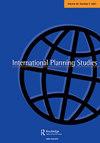Addressing the impossible triad – high inequality, decentralized policy and low local capacity – challenges for drinking water policy in Mexico
IF 1.5
Q4 REGIONAL & URBAN PLANNING
引用次数: 0
Abstract
ABSTRACT What are the planning challenges faced in addressing equity? This paper discusses the importance of understanding institutional and policy contexts affecting planners’ efforts to close water access gaps across communities in low and middle income countries. Three challenges combined complicate local governments action towards water access: decentralization of water policy, high levels of inequality and low levels of local capacity, what we call the ‘impossible triad.’ Our analysis of two programmes designed to address the needs of the most marginalized communities in Mexico shows that programme requirements still fail to consider local constraints. Prior to decentralization, policies designed to reduce water access inequality relied on national government provision of municipal water infrastructure. Decentralized water policies differ, presenting severe institutional challenges for even the most well intentioned planners. This paper emphasizes the importance of national-level government involvement in addressing national-level inequalities and calls for reconsideration of decentralized policymaking structures to address massive water access inequalities.解决不可能的三位一体——高度不平等、分散的政策和地方能力低下——是墨西哥饮用水政策面临的挑战
摘要解决公平问题面临哪些规划挑战?本文讨论了了解影响规划者努力缩小中低收入国家社区用水差距的制度和政策背景的重要性。三个挑战使地方政府在供水方面的行动复杂化:水政策的权力下放、高度的不平等和低水平的地方能力,我们称之为“不可能的三位一体”我们对旨在满足墨西哥最边缘化社区需求的两个方案的分析表明,方案要求仍然没有考虑到当地的制约因素。在权力下放之前,旨在减少用水不平等的政策依赖于国家政府提供的市政供水基础设施。分散的水政策各不相同,即使是最善意的规划者也面临严峻的体制挑战。本文强调了国家一级政府参与解决国家一级不平等问题的重要性,并呼吁重新考虑分散的决策结构,以解决大规模的用水不平等问题。
本文章由计算机程序翻译,如有差异,请以英文原文为准。
求助全文
约1分钟内获得全文
求助全文
来源期刊

International Planning Studies
REGIONAL & URBAN PLANNING-
CiteScore
4.60
自引率
4.80%
发文量
20
期刊介绍:
Planning, at urban, regional, national and international levels, faces new challenges, notably those related to the growth of globalisation as both an objective socio-economic process and a shift in policy-maker perceptions and modes of analysis. International Planning Studies (IPS) addresses these issues by publishing quality research in a variety of specific fields and from a range of theoretical and normative perspectives, which helps improve understanding of the actual and potential role of planning and planners in this context.
 求助内容:
求助内容: 应助结果提醒方式:
应助结果提醒方式:


